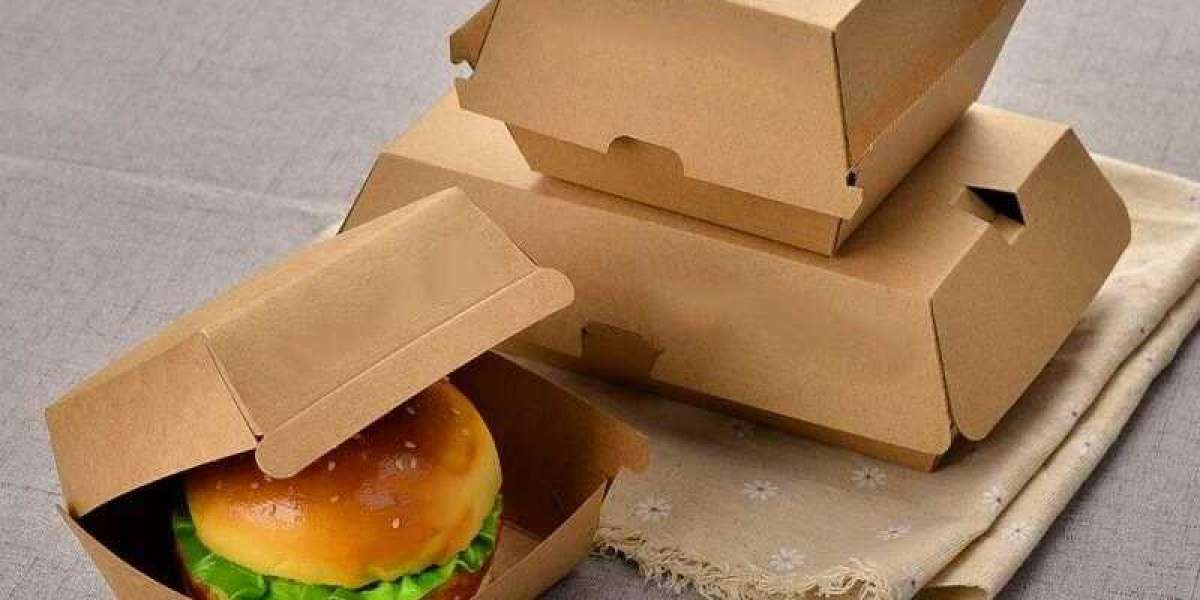Given their tasteful allure and reasonableness, paper Custom food boxes are a typical decision for bundling. Notwithstanding, organizations are progressively searching for harmless ecosystem choices considering developing natural worries. This blog section examines eco-obliging practices for paper food boxes wholesale manufacturing, helping you to make careful choices that limit your normal impression.
- Custom food packaging refers to packaging that is specifically designed and customized for a particular food product.
- Custom printed food packaging boxes are boxes that have been printed with a specific design, logo, or message.
- Branded food boxes are boxes that feature a company's brand identity, such as their logo, colors, and messaging.
- Custom takeout boxes are boxes that are designed to be used for takeout or delivery of food.
- Custom restaurant packaging refers to all types of packaging used by restaurants, including boxes, bags, and containers.
- Custom food packaging bags are bags that are designed to be used for packaging food, such as paper bags or plastic bags.
- Custom food boxes with logo are boxes that feature a company's logo or branding.
Demystifying Sustainability: Key Principles for Eco-Conscious Packaging
Economical bundling goes past utilizing paper. It's tied in with considering the whole lifecycle of the Custom food box, from obtaining materials to removal. Here are a few critical standards to direct your decisions:
- Reduce: Focus on limiting how much material is utilized for your Custom food boxes. Pick the right size to accommodate your item cozily and stay away from pointless space.
- Reuse: Empower the reuse of your Custom food boxes by clients. Consider consolidating an optional capability, similar to a capacity compartment, into the plan.
- Recycle: Focus on using recycled paper content for your Custom food boxes. This reduces reliance on virgin wood pulp and minimizes deforestation.
- Compostable: Explore options for Custom food boxes made from biodegradable materials that can decompose naturally after use.
- Responsible Sourcing: Choose suppliers who prioritize sustainable forestry practices and ensure their paper comes from responsibly managed forests.
Pro Tip: Consider the Entire Lifecycle
Think beyond the initial use of the Custom food box. Will it be easily recycled, composted, or reused?
Material Matters: Sustainable Paper Options for Custom food Boxes
The sort of paper utilized essentially influences the supportability of your Custom food boxes. Consider the following eco-friendly options:
- Recycled Paperboard: This is a promptly accessible and financially savvy choice. Search for paperboard with a high level of post-customer reused content.
- FSC-Certified Paper: Paper with Boondocks Stewardship Social affair (FSC) confirmation comes from proficiently supervised woods, ensuring trustworthy acquiring practices.
- Agricultural Residues: Some Custom food boxes are made from recycled agricultural residues like wheat straw or bamboo, offering a more unique and sustainable alternative.
- Biodegradable Materials: Investigate choices like paper produced using quickly developing grasses or mushrooms, which deteriorate normally after use.
Pro Tip: Match Material to Product
Consider the weight and nature of your product when choosing paper. Thicker recycled paperboard might be suitable for heavier items, while lighter options made from agricultural residues could be perfect for smaller products.
Manufacturing with a Green Mindset: Eco-Friendly Production Processes
Sustainable manufacturing practices extend beyond just the materials used. Look for paper Custom food box suppliers who prioritize these green initiatives:
- Energy Efficiency: Choose suppliers who utilize energy-efficient equipment and renewable energy sources in their production facilities.
- Water Conservation: Manufacturing processes can consume significant water. Partner with suppliers who implement water conservation practices during production.
- Waste Reduction: Search for providers with rehearses that limit squandering during the creation interaction, for example, reusing paper scraps and using offcuts for different purposes.
- Sustainable Inks and Coatings: Opt for Custom food boxes printed with soy-based or vegetable-based inks, which are less harmful to the environment than traditional petroleum-based inks.
Pro Tip: Ask the Right Questions
Don't hesitate to ask potential suppliers about their sustainability practices. Look for information on their website or inquire about their commitment to eco-friendly manufacturing.
Beyond Production: Additional Considerations for Eco-Friendly Custom food Boxes
Here are some additional ways to enhance the sustainability of your paper Custom food boxes:
- Minimize Printing: Opt for simple, single-color printing or consider using natural, unbleached paper for a rustic aesthetic.
- Clear Labeling: Ensure proper labeling for recycling or composting, guiding customers on the appropriate disposal method.
- Sustainable Alternatives for Custom food Films: Explore options for biodegradable Custom food films made from plant-based materials instead of traditional plastic films.
Pro Tip: Partner for Sustainability
Team up with your picked paper Custom food box provider to investigate the most economical choices for your particular requirements. Their skill can assist you with tracking down the ideal harmony among usefulness and eco-cordiality.
The Final Takeaway: Making a Difference with Sustainable Choices
You can minimize your impact on the environment while maintaining an eco-conscious brand image by using sustainable methods for your paper Custom food boxes. By focusing on capable obtaining, eco-accommodating materials, and green assembling processes, you can add to a more manageable future for bundling. Keep in mind that even minor adjustments can have a big impact. In this way, embrace maintainable practices and grandstand your obligation to natural obligation through your decision of frozen food box.



